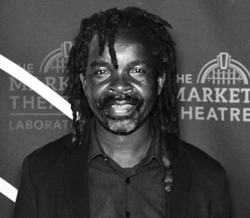Jessica Denyschen recalibrating new path for Arts & Culture Trust
ACT launched a new research unit with University of Johannesburg on Friday at Swiss Hotel School, in Randburg, attended by researchers, policy makers and academics.
By Edward Tsumele, CITYLIFE/ARTS Editor

Interim Chief Executive Officer of arts development organisation, Arts and Culture Trust (ACT) Jessica Denyschen has been at the helm of this organisation for less than a year now.
Denyschen took over as interim CEO from Marcus Desando, who landed a top arts administration position with an international arts organisation in the Netherlands late last year. But already Denyschen is fast recalibrating the way forward for this organisation that for years has been filling in the gaps left out by grant funding for the arts sector by government agencies. These include the Department of Arts and Culture, National Heritage Council, National Arts Council and the National Lottery Distribution Agency for Arts, for example.
Denyschen however told CITYLIFE/ARTS in an interview that the ACT going forward is now moving away from simply dishing out grants to artists, to looking at development of artists’ ideas through mentorship and workshops so that there is sustainability in the creative sector, as these projects are developed to become businesses proper.
“We should think of a way of developing arts projects with the artists to an extent that they can either attract investment or even qualify for loans fromthe bank based on the strength of their business potential. This is the thinking around funding in ACT’s new strategy,” Denyschen said.
This is the overall plan of ACT going forward, basically implementing the strategy that was developed in 2019, and that is to relook at its programmes and tweak them to suit the new reality of arts funding.
One of the burning issues in arts circles is the issue of artists depending on grants year in and year out, without plans to become sustainable businesses.
“That has to change because artists cannot and should not be dependent on grants for ever. There is a need to look at how best agencies can assist artists to professionalise their businesses and practices so that they become sustainable businesses, instead of depending on grants,” Denyschen told CITYLIFE/ARTS in an exclusive interview ahead of a symposium that was held the following day, Friday, October 14, 2022. The symposium was used as a launch pad for a new collaborative research unit with the University of Johannesburg’s College of Business and Economics. The event held at the Swiss Hotel School in Randburg was attended by academics, researchers and policy makers.
It was also after a weekend of triumph for the organisation as on the previous Saturday, ACT announced the winners of a scholarship, worth R350 000 awarded to two young people in the arts to study at tertiary institutions in South Africa.
There were also surprise additional support for the other artists from other organisations in the arts.
During the ceremony the Market Theatre Laboratory invited finalists India Wesi (17 from Sandton, Gauteng) and Yolo Mazwai (18 from Craighall Park, Gauteng) to audition for their two-year performance and theatre skills course. Moving into Dance offered a one- year scholarship to dancer and performer Sanele Kobe (25). These surprise additional offerings not only inspired the recipients but also the audience who gave the finalists a standing ovation for their interpretation of the theme “What Matters”.
“The winners were chosen after a call was sent out and it attracted 89 participants who were auditioned online, out of which 56 were chosen to undergo training and workshops under mentors. Out of the 56, 15 finalists were chosen. So even those whose ideas did not make the cut to the finals, they left with something through these workshops that included mentorship. That is in line with what ACT is going to do going forward,” Denyschen said.
One of those new programmes being the newly collaborative research unit called Arts, Culture Research Unit (Acru), a collaboration between ACT, and University of Johannesburg College of Business and Economics.
“What is good about this research unit is that it will look at the programmes run by ACT, to see what works and what does not work, as well as the trends, and the outcome will guide ACT about the way forward in its programming. The research results will also inform the industry as a whole, beyond ACT,”s needs explained Denyschen.
ACT has also since February this year moved to a new home, Transwerke building at Constitution Hill, which has increasingly become an arts hub of choice in Johannesburg, hosting musicians, visual artists, filmmakers, fashion designers and even poets in addition to arts organisations.
“We moved into this space in February after we started working on the place.
It is also affordable, and therefore we have managed to cut down on rental costs to save money for programmes. We are also able to interact with the sector, with quite a number of creatives passing by for a chat to understand
What we do to assist in professionalising the creative sector with our programming. This interaction has been very successful,” added Denyschen.










